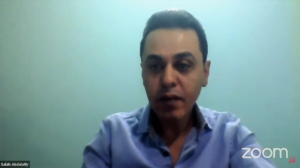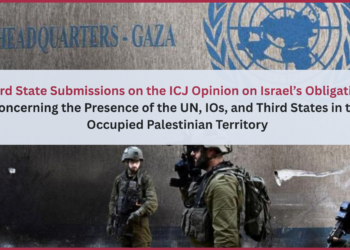United Kingdom – July 30, 2021: Law for Palestine (L4P) organized a panel discussion titled, “Israeli Judiciary and International Law: Can the Palestinians Get Justice?” The panel discussion, which is part of L4P’s Legal Forum for Palestine monthly meetings, discussed the feasibility of Palestinians resorting to “Israeli Courts” on key issues such as settlements, home demolitions and land confiscations. It further included discussions on how the Israeli Supreme Court interprets and adheres to international law, and what avenues are available for Palestinians to attain justice.
The panel discussion was held on the evening of Wednesday, July 28, 2021 via Zoom, and hosted Mueen Odeh, a Palestinian lawyer and human rights defender and a doctoral researcher in the field of peace and conflict resolution at George Mason University in the United States, and Sawsan Zahr, a Palestinian lawyer, human rights defender and Deputy Director of Adalah Center for Arab Minority Rights in Israel.
The meeting was opened by Dr. Salah Abdel Ati, member of the Board of Trustees of the Law for Palestine (L4P) Organization, and head of the International Commission to Support the Rights of the Palestinian People. Twenty-two academics, jurists and legal experts from several different countries participated in the discussion. It was followed by the 850 members of the Legal Forum for Palestine around the world.

The ‘Enlightened Occupation’
Mueen Odeh initiated the discussion by invoking the interpretations of the Israeli Supreme Court of international law and how it dealt with it in favor of issuing decisions that support the occupation while trying to highlight a side of formal justice for the Palestinians in some cases. For example, in the Wall and Mara’aba case, the Court affirmed that the wall is legal (despite an advisory opinion of the International Court of Justice that ruled it illegal), but the Court addressed the issue of the great harm it causes to Palestinians in the area, and therefore the decision was to modify the Wall’s route with its legalization instead of removing it.

Odeh described this policy as a policy of enlightened occupation, as it allows the Palestinians to resort to the Israeli judiciary and file allegations before it, which gives a global impression of the integrity of the Israeli judiciary and its commitment to international laws. On the ground, however, in most cases, the Israeli judiciary does not do justice to the Palestinians, and only gives them formal rights that do not bring about a real change in their reality.
The Israeli Supreme Court Has Proven Its Role in Enabling the Occupation
For her part, Sawsan Zahr spoke in her intervention about the role of the Israeli Supreme Court in dealing with the petitions submitted by the Palestinians when they resort to the Israeli judiciary. Zahr noted that the Court ignores many petitions submitted to it by the Palestinians. For example, the court did not delve into the extent of the impact of the national law on the Palestinians in Jerusalem, nor on its effect on the legalization of the establishment of settlements. She added that the Israeli Supreme Court’s decision to reject the petitions against the constitutionality of the nation-state law gives the possibility to complete the settlement project, which constitutes a war crime. Zahr considered that the court has a major role in strengthening the occupation and enabling its permanence, in violation of international laws in this regard.

The attendees discussed with the meeting’s guests the issue of the unfairness of the Israeli judiciary and the possibility of considering it part of the apartheid regime before the International Criminal Court, the need to pressure the international community to convert the advisory opinion of the International Court of Justice on the wall into a binding decision, and the problem of applying Israeli laws to the occupied Palestinian territories, such as the national law, etc…; Whether resorting to the Israeli judiciary is a recognition of the legitimacy of the occupation or not, and other interventions that the guests discussed with the attendees during the panel discussion.
It is noteworthy that this seminar comes within the activities of the Legal Forum for Palestine of the Law for Palestine, which includes holding a monthly online meeting that includes international experts and with the participation of researchers, students and interested people from different countries of the world to discuss topics and developments related to international law and Palestine, in addition to Effective networking between lawyers interested in Palestine from all over the world.





